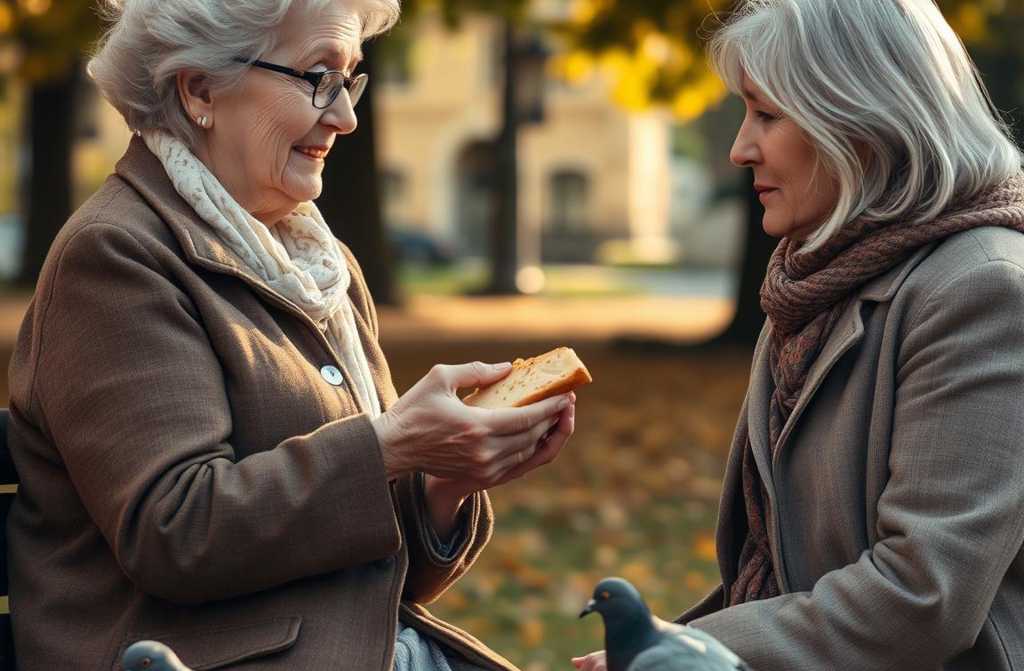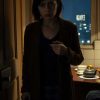From Meeting to Parting
Five years ago, Rose found herself alone. Her husband had passed away after a long battle with cancer. Before that, her only daughter had married and moved to another city, first having a son named William and three years later a daughter named Emily. When Roses husband was still healthy, she would visit her daughter. But once he fell ill, she couldnt leave him alone.
Her daughter visited occasionally, leaving the children with her husband. She believed they shouldnt see their dying grandfather. She came alone to the funeral, too, and left right after.
“Sorry, Mum, but my husband and the kids You should come visit us. What will you do here all by yourself?”
And she was gone. Rose was left alone. She missed her husband desperatelysick as he was, shed have given anything for him to still be alive. Now what? No one needed her.
After nine days, Rose decided to visit her daughter. But her daughter and son-in-law worked long hours, and the grandchildren kept their distance, barely remembering her. Rose felt like an outsider. After a week, she packed to leave.
“Mum, why not stay a bit longer?” her daughter suggested, but when Rose refused, she didnt press further.
Rose never visited again. Last year, they stopped by on their way back from holiday. William was nearly fourteen, always with headphones in and eyes glued to his tablet. Emily, with pink streaks in her hair, spent her days texting and chewing gum.
Rose tried to talk to her daughter about how harmful excessive screen time was for young minds. Did she know what they were watching or who they were talking to?
“Mum, all kids are like that now. Banning things only makes it worse,” her daughter dismissed her.
Before they left, Rose tried again.
“Its hard being alone. Visit more often. The grandchildren dont even know me. While I still have energy, maybe they could stay with me during the holidays?”
“Mum, why take on extra trouble?”
“Theyre your children. What trouble?”
“Well see,” her daughter said, but a whole year passed without a visit, just the occasional call.
So Rose went to them herself. Why not? She was retired, free. The parents worked all day, while William and Emily lived on pizza and takeaways. What kind of food was that? Rose took over the cooking. At first, everyone loved her soups, pancakes, and piesbut then the grandchildren went back to pizza. Her son-in-law once caught her washing dishes by hand and frowned.
“We have a dishwasher. No need to slave over the sink.”
Her daughter sighed and rearranged the drying rack her way. William complained that Grandma had “messed up” his wardrobe. Rose tried to explain shed just tidied it.
“Mum, dont interfere,” her daughter advised.
“Gran, stop baking piesIve already put on weight,” Emily said.
“And pizza doesnt make you fat?” Rose countered.
In the end, she realized she was in the way, doing everything wrong, and it was time to leave. Her daughter didnt argue, and her son-in-law promptly offered to drive her to the station.
Rose ached for her husband. If only Nick were still here Why had he left her so soon? No one to talk to. Who would care for her ifGod forbidshe fell ill?
She used to knit and embroider, but her eyesight had worsened, straining gave her headaches. What else was there to do in retirement? Bake pies? Who would eat them?
One friend had died soon after her husband; the other was swamped with grandchildren, no time for Rose.
***
The last warm days of an Indian summer lingered. The sun shone, though the air was crisp. Golden leaves rustled underfoot. Rose packed some stale bread and walked to the park.
Sitting on a bench, she fed the pigeons, soon surrounded by a fluttering flockeven sparrows joined in.
As she watched them, she brooded over her unhappy lot. Youth was fleeting, life fragileold age crept in unnoticed. Shed hoped to grow old with Nick, caring for each other. He was gone, and her daughter and grandchildren didnt need her
“Quite a gathering,” someone remarked.
A man sat at the other end of the benchwell-groomed, about her age or slightly older. She hadnt noticed him arrive.
“Ive seen you here often,” he said.
Rose didnt recognize him. She rarely paid attention during her walks, lost in thought.
“Im alone too. My wife died eight years ago. Still havent gotten used to it,” he sighed.
*As if he read my mind*, she thought. She studied himneatly dressed, trousers pressed, clean-shaven.
“I love autumn. These last warm days are lovely. Once the rains come, all this beauty will vanish,” he said, tilting his face to the sun.
“Does someone help you? Youre so well put together,” Rose asked.
“Had to learn after my wife passed. Not so hard. My sons busy with his family. Think men cant manage alone? Im Edward. Look how bold these sparrows arestealing crumbs right under the pigeons noses. And your name?”
“Rose.”
“Lovely name. Uncommon. My wife was Gertrude, named after her great-grandmother. Fancy going to the cinema? Its getting chilly.”
The sun had vanished behind clouds, the air grown colder. Rose meant to refuse, but the thought of her empty flat was unbearable.
“Whats playing?” she asked.
“Does it matter?” he smiled.
It didnt. When had she last been to the cinema? She couldnt recall. She agreed. The theatre was unrecognizableplush seats, a massive screen, booming sound. But she enjoyed the film.
After, as dusk settled, Edward suggested tea at a café. Rose declined.
“Another time, then?” he asked hopefully.
She imagined stepping into her silent flat
“Come to mine instead. I live nearby. Ill make tea and pancakes.”
“Would that be proper?”
“Why not? Unless youre in a hurry? I made too many pancakesno one to eat them.”
At her door, she worried about nosy neighbours, but the courtyard was empty.
“Cozy place. Your husband?” Edward nodded at the framed portrait.
“Yes. Cancer.” She nearly complained about her daughter but stopped. Her solitude was plain enough.
She brewed tea, warmed the pancakes, set out jam. Edward ate heartily, praising her cooking.
“Lots of booksmedical ones too. Were you a doctor?”
“No. A biology teacher. Dreamed of being a doctor, but after Mum died young, I needed work. Studied evenings while working. Then marriage, a child. The dream stayed a dream.”
“I was in the military. Mind?” He browsed her shelves, recognizing many titles.
“Thank you. Youre a rare womaninviting a stranger in like this.”
“You werent planning to rob me, were you?”
“God forbid. I should go. Will you walk tomorrow? Same place?”
From then on, they strolled togethertwo lonely souls, starved for company.
One evening, her daughter called.
“Mum, how are you?”
“Fine. Walking, even went to the cinema a few times.”
“Alone?”
“No. Who goes alone? With a friend.”
“Mum, are you *seeing* someone?”
“Dont be silly. We just walk in the park.”
“Be careful! So many scammers these days. Why not visit us?”
“Why? I dont want to intrude. *You* visit *me*.”
“Dont you dare get involved! Is this friend a widower? Drove his wife to an early grave and now wants a free housekeeper? Or after your flat? Hell sweet-talk you into signing it over, then”
“Enough! Next youll say Ive gone senile.”
“What else should I think? Remember Mrs. Lightfoot?”
“Youve never even met him! I never interfered in your lifewhy do you meddle in mine? The children have holidays soonsend them to me!”
They nearly argued, hanging up upset.
Autumn tightened its grip. The park grew too cold, so Edward invited Rose to his cottagehelp rake leaves, check on the place.
“Its big, with a fireplace. Lovely surroundings. Ive barely been since my wife died.”
Rose agreed. The cottage was charming, the fireplace cozy. Edward raked leaves while she cooked lunchuntil an SUV pulled up.
Edward brightenedhis son, Rose guessed.
She set the kettle on, laid the table. Peering outside, she saw their conversation turn heatedshouting, gestures sharp. She stepped onto the porch.
“Hello. Why not come inside?”
“Shes *running* the place now? Dad, have you lost your mind? Whats she doing here?”
Edwards son accused Rose of being a gold-digger, targeting lonely widowers for their property. He even lunged at heruntil Edward clutched his chest, collapsing. Rose rushed to support him.
“Get your hands off him!”
“Help me get him inside and call an ambulance!”
“Bossing *me* around” But seeing his fathers pallor, he relented.
“The ambulance will take ages. Help me get him in the car.”
They laid Edward in the back seat. When Rose moved to join them, his son slammed the door, sped off.
Rose stood stranded. She locked up, trudged to the bus stop in drizzling rain.
Her flat greeted her with hollow silence. Nicks portrait seemed to judge her from the wall.
“Forgive me,” she whispered.
Warmed by tea, she called hospitals. Edward was in intensive careheart attack.
The next day, she visitedand faced his son.
“What are *you* doing here? Here to finish him off? You wont get a pennyI made him write a will. Get out before I call the police.”
Eyes on them, Rose left in tears.
She returned the next day, lying that she was his wife. Edward had died at dawn. She skipped the funeralcouldnt bear more accusations.
Two kindred spirits, abandoned by their families, found each otheronly to be torn apart.
A week later, her daughter called. “Were coming soon.”
“Whats wrong?” Rose braced for more bad news.
Her daughter arrived with the children and bags.
“Mum and Dad are divorcing,” Emily said.
“Why?”
“Dad has another woman,” William added.
Her daughter wept for days. The grandchildren, unusually quiet, clung to Rose, forgetting their screens.
She relished the sudden bustle, being needed again.
But for how long?
*Sometimes, those who push us away need us most when theyve nowhere else to turn.*







